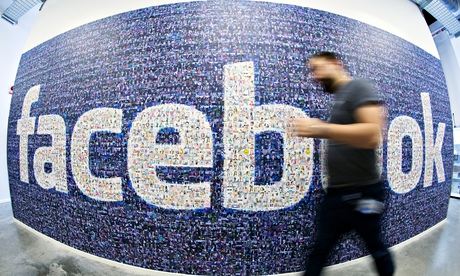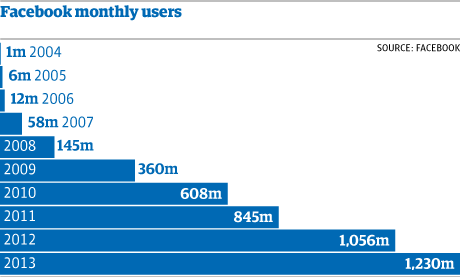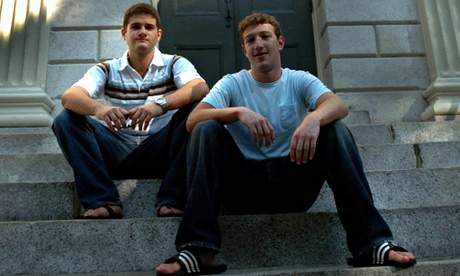 |
|
The Facebook logo created with pictures of its users.
Photograph: Jonathan Nackstrand/AFP/Getty Images
|
What does the future look like? According to Facebook, exactly
10 years after the social network was created, the future is called
Paper. But it's not quite as nostalgic as it sounds. This is the future
where we write, film and share our stories via our mobile phones. A
sleek cut-down version of the Facebook site, Paper replaces buttons with
touchscreen swipes, and uses full-screen to play video on the handheld
devices, where the future of the internet will be fought.
But Mark Zuckerberg, Facebook's 29-year-old founder, also wants to hire human editors to promote the most interesting content, harking back to newspapers themselves. In this case, the retro nomenclature represents something more: a desire to find new ways to make Facebook more relevant to the human desire for communication, by enlisting people themselves.
It is a sign that Facebook is looking to secure its place in the firmament by branching out into new forms of communication. By the end of 2013, Facebook was being used by 1.23 billion users worldwide, adding 170 million in just one year.
Yet the scale of the ambition is a far cry from when Zuckerberg was an ambitious and competitive freshman at Harvard. Immortalised in The Social Network, Zuckerberg launched the site from his dorm room on 4 February 2004 – a technological replacement for a college directory and messages left on student doors.
It was a hit almost immediately, although in today's terms the early progress sounds modest. In 2006, Facebook already had 12 million users across US colleges, 60% of whom logged in every day. But by then it was already valued at $100m (£61m).
Meanwhile, Zuckerberg himself may come to be known as the most underestimated man of his generation, steering Facebook from an idea to link students to the default communication platform for the online western world.
The site is now worth $135bn with revenues of $7.87bn in 2013, including $1.5bn in profit. Globally, 556 million people now access the site every day on their smartphone or tablet and at the end of 2013, for the first time, Facebook made more than $1bn in revenue from mobile advertising in just one quarter.
Part of Facebook's success has been timing, says Dr Bernie Hogan, research fellow at the Oxford internet institute, because the world was ready for a shared list of connections that works like a supercharged, definitive phone book for the digital age. "Before Facebook, we had to cover up our identities online and there was uncertainty over who to trust. Facebook gave us the notion that it was safe, and useful."
 Facebook's neutrality is partly why younger users are attracted to
new and more edgy platforms such as the messaging app Snapchat, says
Hogan, though they will a retain a presence on Facebook to show a safe,
public face.
Facebook's neutrality is partly why younger users are attracted to
new and more edgy platforms such as the messaging app Snapchat, says
Hogan, though they will a retain a presence on Facebook to show a safe,
public face.
From its earliest days, Facebook has navigated – even pioneered – the territory around privacy, and how we express our personal identities online. This has been a precarious journey, and in September 2006 – before the site was open beyond the US college network – it was dealing with concern over the introduction of the newsfeed and over-sharing users' personal information.
In most cases, Facebook has adapted in response to feedback. Even the most controversial features it has eventually killed off – such as Beacon, which published users' purchases and related advertiser information in feeds – have still informed the site's development.
But as Facebook advanced it also helped create a world in which people live with dual identities –online and in real life. "People have really gotten comfortable not only sharing more information and different kinds, but more openly and with more people," said Zuckerberg in 2010 during an intense few months as controversy raged over the complexity of Facebook's privacy settings. "That social norm is just something that has evolved over time."
 Mark Zuckerberg, right, and one of the other co-founders of
Facebook, Dustin Moskovitz, at Harvard University in 2004. Photograph:
Getty Images/Boston Globe
But Zuckerberg's own attitude to real identities has shifted.
Facebook's currency of real-world identities, both for users and
advertisers, has been replaced with a recognition that for some
exchanges – like those of rival messaging app Snapchat – anonymity and a
different, less committed style of engagement are attractive.
Mark Zuckerberg, right, and one of the other co-founders of
Facebook, Dustin Moskovitz, at Harvard University in 2004. Photograph:
Getty Images/Boston Globe
But Zuckerberg's own attitude to real identities has shifted.
Facebook's currency of real-world identities, both for users and
advertisers, has been replaced with a recognition that for some
exchanges – like those of rival messaging app Snapchat – anonymity and a
different, less committed style of engagement are attractive.
"I don't know if the balance has swung too far, but I definitely think we're at the point where we don't need to keep on only doing real identity things," he told BusinessWeek recently. "If you're always under the pressure of real identity, I think that is somewhat of a burden."
Facebook has been aggressively exploring mobile since its IPO, when investors expressed concern that its strategy was too focused on desktop. Its repositioning as a mobile-first business has been nothing short of remarkable; Zuckerberg himself even removed his desktop screen from his desk and viewed the site purely on his smartphone. Becoming a mobile company was Facebook's most urgent priority, he told staff. In April 2012 he stunned the tech industry by paying $1bn for Instagram, a photo-sharing app with 100 million users.
"Facebook is a bad investment," squealed a Forbes headline from 2012, cautioning that this looked like a defensive move to buy a mobile-ready rival. "Facebook will have to fend off more and more young companies gnawing at its core. The odds are that Zuckerberg will one day face an opponent that can't be bought."
Criticised for being overvalued at the time of its 2012 flotation, Facebook got off to an uncertain start as a publicly traded company, but has since found its feet: floated at $38 a share, the stock now changes hands at $61.76.
Christopher Poole, founder of irreverent cult bulletin board 4chan, is critical of Facebook's concept of being a mirror to human identity. "Relationships are not reducable to the things we do," Hogan says. "Relationships are built on time spent together. On Facebook, you aren't saying: 'This is special because you did it with me.' You're saying: 'This is special because I did it.'
"It's very healthy that we don't take Facebook too seriously, that we don't conflate selective moments with real, lived experience. We need to distinguish our exhibited selves from our real selves."
However, the Edward Snowden files, which revealed the extent of US and UK government surveillance of web users, brought with them a crisis of confidence. Many web businesses, like Facebook, have battled to convince users to trust them with their data, offering powerful, useful services for free in return for selling targeted ads.
Zuckerberg was one of those to speak out unambiguously after the first revelations. "The government response was: 'Oh don't worry, we're not spying on any Americans.' Oh, wonderful: that's really helpful to companies trying to serve people around the world, and that's really going to inspire confidence in American internet companies. I thought that was really bad," he said.
Advertisers, however, do not appear to have been put off. Facebook accounted for 5.7% of all global digital advertising revenues in 2013, and 18.4% of mobile ad spend, according to eMarketer.
Venture capitalist Saul Klein, who worked with Facebook when with Skype, feels Zuckerberg has been hugely underestimated. "What Facebook is doing with a site used by 1 billion people a day is an order of magnitude greater than anything – it's a remarkable feat of engineering," he said, pointing to the fact that London is still the only English-speaking city in Facebook's top 10. "It's not just about the US anymore – tech is now a global phenomenon. I'm not sure even Facebook quite understands that – they are the canary in that coalmine."
Meanwhile, while many computer scientists have built successful companies, not least his idol Bill Gates, Facebook has arguably not just given engineers power but structured its very businesses processes in "the hacker way". An oft-repeated slogan on Facebook's office reads "move fast and break things", a strategy that means working in a continual state of developmentIts founder's self belief has been noticeable from the start. "Zuckerberg always felt Facebook could be much bigger than anyone could see," said Klein. That belief also inspired a remarkable confidence to say no. Aged 22, Zuckerberg turned down a $1bn acquisition offer from Yahoo.
"There is no CEO in the world that could walk in and do that job. There is no preparation for it – it is completely unprecedented. He has lots of self confidence, lacks ego and is very mature."
And as for the next 10 years? In 2024, Zuckerberg will not even be 40.
January 2004 Mark Zuckerberg starts work on thefacebook.com
February 2004 Site launched by Zuckerberg in his Harvard dorm room with co-founders Dustin Moskovitz, Chris Hughes, Andrew McCollum and Eduardo Saverin. They email 300 fellow students and the site takes off
February 2004 Cameron and Tyler Winklevoss and Divya Narendra accuse Zuckerberg of stealing their HarvardConnection idea of a social network, but eventually settle in 2011
June 2004 Facebook expands to Stanford, Columbia and Yale
October 2005 Napster founder Sean Parker invests in Facebook and encourages Zuckerberg to change the web address to facebook.com
September 2006 Membership opened to all
February 2009 Like button introduced
August 2010 Places feature allows users to plot their location
April 2012 Facebook buys Instagram for $1bn
May 2012 Facebook's initial public offering on the Nasdaq
October 2013 Facebook reaches 1 billion users
February 2014 Facebook's 10th birthday – and milestone of 1.23 billion users
• Facebook's mobile journey has only just begun, but already makes money
But Mark Zuckerberg, Facebook's 29-year-old founder, also wants to hire human editors to promote the most interesting content, harking back to newspapers themselves. In this case, the retro nomenclature represents something more: a desire to find new ways to make Facebook more relevant to the human desire for communication, by enlisting people themselves.
It is a sign that Facebook is looking to secure its place in the firmament by branching out into new forms of communication. By the end of 2013, Facebook was being used by 1.23 billion users worldwide, adding 170 million in just one year.
Yet the scale of the ambition is a far cry from when Zuckerberg was an ambitious and competitive freshman at Harvard. Immortalised in The Social Network, Zuckerberg launched the site from his dorm room on 4 February 2004 – a technological replacement for a college directory and messages left on student doors.
It was a hit almost immediately, although in today's terms the early progress sounds modest. In 2006, Facebook already had 12 million users across US colleges, 60% of whom logged in every day. But by then it was already valued at $100m (£61m).
Meanwhile, Zuckerberg himself may come to be known as the most underestimated man of his generation, steering Facebook from an idea to link students to the default communication platform for the online western world.
The site is now worth $135bn with revenues of $7.87bn in 2013, including $1.5bn in profit. Globally, 556 million people now access the site every day on their smartphone or tablet and at the end of 2013, for the first time, Facebook made more than $1bn in revenue from mobile advertising in just one quarter.
Part of Facebook's success has been timing, says Dr Bernie Hogan, research fellow at the Oxford internet institute, because the world was ready for a shared list of connections that works like a supercharged, definitive phone book for the digital age. "Before Facebook, we had to cover up our identities online and there was uncertainty over who to trust. Facebook gave us the notion that it was safe, and useful."
 Facebook's neutrality is partly why younger users are attracted to
new and more edgy platforms such as the messaging app Snapchat, says
Hogan, though they will a retain a presence on Facebook to show a safe,
public face.
Facebook's neutrality is partly why younger users are attracted to
new and more edgy platforms such as the messaging app Snapchat, says
Hogan, though they will a retain a presence on Facebook to show a safe,
public face.From its earliest days, Facebook has navigated – even pioneered – the territory around privacy, and how we express our personal identities online. This has been a precarious journey, and in September 2006 – before the site was open beyond the US college network – it was dealing with concern over the introduction of the newsfeed and over-sharing users' personal information.
In most cases, Facebook has adapted in response to feedback. Even the most controversial features it has eventually killed off – such as Beacon, which published users' purchases and related advertiser information in feeds – have still informed the site's development.
But as Facebook advanced it also helped create a world in which people live with dual identities –online and in real life. "People have really gotten comfortable not only sharing more information and different kinds, but more openly and with more people," said Zuckerberg in 2010 during an intense few months as controversy raged over the complexity of Facebook's privacy settings. "That social norm is just something that has evolved over time."
 Mark Zuckerberg, right, and one of the other co-founders of
Facebook, Dustin Moskovitz, at Harvard University in 2004. Photograph:
Getty Images/Boston Globe
But Zuckerberg's own attitude to real identities has shifted.
Facebook's currency of real-world identities, both for users and
advertisers, has been replaced with a recognition that for some
exchanges – like those of rival messaging app Snapchat – anonymity and a
different, less committed style of engagement are attractive.
Mark Zuckerberg, right, and one of the other co-founders of
Facebook, Dustin Moskovitz, at Harvard University in 2004. Photograph:
Getty Images/Boston Globe
But Zuckerberg's own attitude to real identities has shifted.
Facebook's currency of real-world identities, both for users and
advertisers, has been replaced with a recognition that for some
exchanges – like those of rival messaging app Snapchat – anonymity and a
different, less committed style of engagement are attractive."I don't know if the balance has swung too far, but I definitely think we're at the point where we don't need to keep on only doing real identity things," he told BusinessWeek recently. "If you're always under the pressure of real identity, I think that is somewhat of a burden."
Facebook has been aggressively exploring mobile since its IPO, when investors expressed concern that its strategy was too focused on desktop. Its repositioning as a mobile-first business has been nothing short of remarkable; Zuckerberg himself even removed his desktop screen from his desk and viewed the site purely on his smartphone. Becoming a mobile company was Facebook's most urgent priority, he told staff. In April 2012 he stunned the tech industry by paying $1bn for Instagram, a photo-sharing app with 100 million users.
"Facebook is a bad investment," squealed a Forbes headline from 2012, cautioning that this looked like a defensive move to buy a mobile-ready rival. "Facebook will have to fend off more and more young companies gnawing at its core. The odds are that Zuckerberg will one day face an opponent that can't be bought."
Criticised for being overvalued at the time of its 2012 flotation, Facebook got off to an uncertain start as a publicly traded company, but has since found its feet: floated at $38 a share, the stock now changes hands at $61.76.
Christopher Poole, founder of irreverent cult bulletin board 4chan, is critical of Facebook's concept of being a mirror to human identity. "Relationships are not reducable to the things we do," Hogan says. "Relationships are built on time spent together. On Facebook, you aren't saying: 'This is special because you did it with me.' You're saying: 'This is special because I did it.'
"It's very healthy that we don't take Facebook too seriously, that we don't conflate selective moments with real, lived experience. We need to distinguish our exhibited selves from our real selves."
However, the Edward Snowden files, which revealed the extent of US and UK government surveillance of web users, brought with them a crisis of confidence. Many web businesses, like Facebook, have battled to convince users to trust them with their data, offering powerful, useful services for free in return for selling targeted ads.
Zuckerberg was one of those to speak out unambiguously after the first revelations. "The government response was: 'Oh don't worry, we're not spying on any Americans.' Oh, wonderful: that's really helpful to companies trying to serve people around the world, and that's really going to inspire confidence in American internet companies. I thought that was really bad," he said.
Advertisers, however, do not appear to have been put off. Facebook accounted for 5.7% of all global digital advertising revenues in 2013, and 18.4% of mobile ad spend, according to eMarketer.
Venture capitalist Saul Klein, who worked with Facebook when with Skype, feels Zuckerberg has been hugely underestimated. "What Facebook is doing with a site used by 1 billion people a day is an order of magnitude greater than anything – it's a remarkable feat of engineering," he said, pointing to the fact that London is still the only English-speaking city in Facebook's top 10. "It's not just about the US anymore – tech is now a global phenomenon. I'm not sure even Facebook quite understands that – they are the canary in that coalmine."
Meanwhile, while many computer scientists have built successful companies, not least his idol Bill Gates, Facebook has arguably not just given engineers power but structured its very businesses processes in "the hacker way". An oft-repeated slogan on Facebook's office reads "move fast and break things", a strategy that means working in a continual state of developmentIts founder's self belief has been noticeable from the start. "Zuckerberg always felt Facebook could be much bigger than anyone could see," said Klein. That belief also inspired a remarkable confidence to say no. Aged 22, Zuckerberg turned down a $1bn acquisition offer from Yahoo.
"There is no CEO in the world that could walk in and do that job. There is no preparation for it – it is completely unprecedented. He has lots of self confidence, lacks ego and is very mature."
And as for the next 10 years? In 2024, Zuckerberg will not even be 40.
Likes and spikes
January 2004 Mark Zuckerberg starts work on thefacebook.com
February 2004 Site launched by Zuckerberg in his Harvard dorm room with co-founders Dustin Moskovitz, Chris Hughes, Andrew McCollum and Eduardo Saverin. They email 300 fellow students and the site takes off
February 2004 Cameron and Tyler Winklevoss and Divya Narendra accuse Zuckerberg of stealing their HarvardConnection idea of a social network, but eventually settle in 2011
June 2004 Facebook expands to Stanford, Columbia and Yale
October 2005 Napster founder Sean Parker invests in Facebook and encourages Zuckerberg to change the web address to facebook.com
September 2006 Membership opened to all
February 2009 Like button introduced
August 2010 Places feature allows users to plot their location
April 2012 Facebook buys Instagram for $1bn
May 2012 Facebook's initial public offering on the Nasdaq
October 2013 Facebook reaches 1 billion users
February 2014 Facebook's 10th birthday – and milestone of 1.23 billion users
• Facebook's mobile journey has only just begun, but already makes money

No comments:
Post a Comment